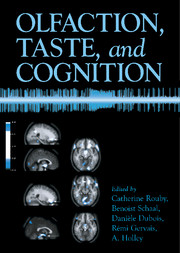Book contents
- Frontmatter
- Contents
- Contributors
- Preface
- Acknowledgments
- A Tribute to Edmond Roudnitska
- OLFACTION, TASTE, AND COGNITION
- Section 1 A Specific Type of Cognition
- 1 Olfaction and Cognition: A Philosophical and Psychoanalytic View
- 2 Cognitive Aspects of Olfaction in Perfumer Practice
- 3 The Specific Characteristics of the Sense of Smell
- Section 2 Knowledge and Languages
- Section 3 Emotion
- Section 4 Memory
- Section 5 Neural Bases
- Section 6 Individual Variations
- Index
- References
2 - Cognitive Aspects of Olfaction in Perfumer Practice
Published online by Cambridge University Press: 21 September 2009
- Frontmatter
- Contents
- Contributors
- Preface
- Acknowledgments
- A Tribute to Edmond Roudnitska
- OLFACTION, TASTE, AND COGNITION
- Section 1 A Specific Type of Cognition
- 1 Olfaction and Cognition: A Philosophical and Psychoanalytic View
- 2 Cognitive Aspects of Olfaction in Perfumer Practice
- 3 The Specific Characteristics of the Sense of Smell
- Section 2 Knowledge and Languages
- Section 3 Emotion
- Section 4 Memory
- Section 5 Neural Bases
- Section 6 Individual Variations
- Index
- References
Summary
Introduction
For their survival, human beings are less dependent than many other mammals on the use of their olfactory systems. One of the reasons for this decreased biological role for smell in humans is that information about the world needed for everyday life is available to humans through a wide variety of channels, including language as a vehicle for scientific and technical knowledge. The cognitive content of olfactory cues, which is of vital importance to many vertebrate species, enabling them to behave efficiently in their physical and biological environments, is comparatively of very modest importance for humans, who have come to rely on more sophisticated and more accurate sources of information. This is especially manifest in advanced societies.
In contrast to the relative regression in the ways humans use the informative-cognitive content of odors, odors still exert a powerful affective dimension. Odors are pleasant or unpleasant. This emotional component presumably originated in an evolutionary strategy associating sensory pleasure with beneficial consequences of approaching various odor sources, and displeasure with dangerous consequences of such an approach. Although the link between the actual emotional effect of an odor and its potential behavioral meaning was not clear in most cases, there evolved a general attitude that consisted in attempts to avoid unpleasant odors and increase one's exposure to pleasant ones.
The art of concocting perfumes can be seen as a specifically human activity that leads a biological mechanism out of its natural domain of expression in order to make it serve a cultural purpose.
- Type
- Chapter
- Information
- Olfaction, Taste, and Cognition , pp. 16 - 26Publisher: Cambridge University PressPrint publication year: 2002
References
- 12
- Cited by

